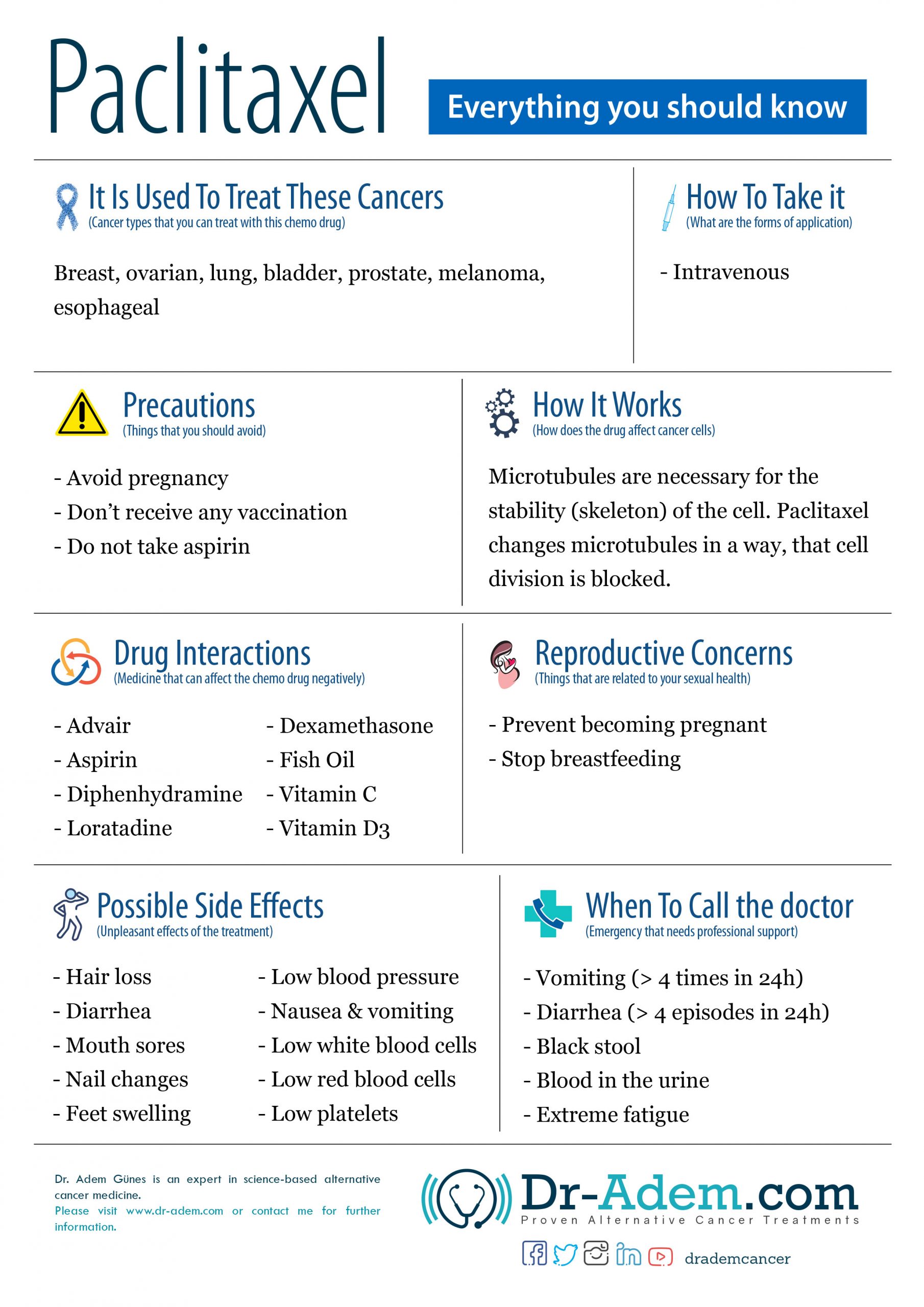Fact Sheet – Everything You Should Know
In this Paclitaxel fact sheet, you’ll get to know about the precautions, usage, possible side effects, and the types of cancer that you can treat with this chemo drug.

Embed this Infographic on your site:
<a href='https://dr-adem.com/paclitaxel-fact-sheet/'><img src='https://dr-adem.com/wp-content/uploads/2019/11/Paclitaxel2-scaled.jpg' alt='Paclitaxel Fact Sheet'/></a>Here’s the Paclitaxel fact sheet to get detailed information about Paclitaxel
It Is Used To Treat These Cancers
(Cancer types that you can treat with this chemo drug)
- Breast
- Ovarian
- Lung
- Bladder
- Prostate
- Melanoma
- Esophageal
How To Take it
(What are the forms of application)
- Intravenous
Precautions
(Things that you should avoid)
- Avoid pregnancy
- Don’t receive any vaccination
- Do not take aspirin
Mechanism of Action of Paclitaxel
(How does the drug affect cancer cells)
Paclitaxel belongs to the mitose inhibitors (Taxane subgroup). It binds itself to the cells’ microtubules (a structure which gives the cells its form and structure), stabilizing them. This stability prevents the mitosis (cell division process) from happening, preventing them from dividing. A second effect is that the accumulation of these microtubules inside the cells eventually leads to cell apoptosis (programmed cell death).
Drug Interactions
(Medicine that can affect the chemo drug negatively)
- Advair
- Aspirin
- Diphenhydramine
- Loratadine
- Dexamethasone
- Fish Oil
- Vitamin C
- Vitamin D3
Reproductive Concerns
(Things that are related to your sexual health)
- Pregnancy prevention during and until 6 months after the treatment (men and women)
- Stop breastfeeding
- Consider sperm freezing if willing to bear children
Possible Side Effects
(Unpleasant effects of the treatment)
- Hair loss
- Diarrhea
- Mouth sores
- Nail changes
- Feet swelling
- Peripheric neuropathy
- Skin rashes
- Bradycardia (slower heartbeats)
- Low or high blood pressure
- Nausea & vomiting
- Joint and muscle pains
- Liver toxicity
- Low white blood cells: raise the risk of bacterial infection
- Low red blood cells: can lead to fatigue, general lack of interest and drive to be active
- Low platelets: can lead to bleeding (nose, gums) and in extreme cases to internal bleeding intestinal, brain, joints)
- Infertility
When To Call the doctor
(Emergency that needs professional support)
- Vomiting (>4 times in 24h): can lead to severe dehydration and electrolyte disbalance
- Diarrhea (>4 episodes in 24h): can also lead to severe dehydration and electrolyte disbalance
- Black stool: can be a sign of intestinal bleeding
- Blood in the urine
- Extreme fatigue: can be a sign of severe anemia (low blood cells)
- Fever > 37,8°C


